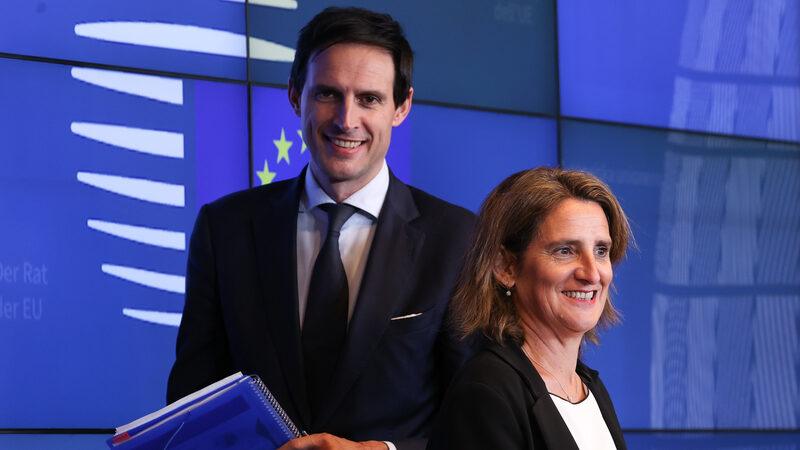The 27 member states agreed to pursue a tripling of renewable energy by 2030 but softened language on phasing out fossil fuels
EU countries on Monday (16 October) adopted a common stance for the United Nations Cop28 international climate conference but language on the EU’s emissions reduction target and fossil fuel exit goal was softened to reach a unanimous decision.
The EU’s 27 environment ministers met in Luxembourg on Monday to agree on the EU’s stance for the Cop28 summit opening in Dubai on 30 November, throwing their weight behind a goal to triple global renewable energy capacity and double energy efficiency improvements by 2030.
The European Union will also push for a “predominantly fossil-free” global energy sector “well before 2050” and strive to reach a “fully or predominantly decarbonised power system in the 2030s,” according to wording agreed by the bloc’s environment ministers.
However, the most ambitious countries had to accept watered-down language on the EU’s push to phase out fossil fuels and reduce emissions as the decision needed to be taken by unanimity.
“Would [the Commission and Presidency] have been able to go even further? Absolutely. And yet, you know, this is a Union where, in the end, we create a mandate with 27 countries,” said EU climate chief Wopke Hoekstra after the meeting.
The European Commission and EU presidency holder Spain pushed for stronger language on emissions reduction, saying the EU’s updated legislation would raise the bloc’s climate target from a 55% net reduction in greenhouse gas emissions by 2030 to a 57% reduction.
But they had to bow to pressure from Eastern EU countries, which have a more significant challenge decarbonising their economies because of their heavier reliance on coal.
“Texts adopted by unanimity always take a little longer to agree. European countries have quite different energy situations, with some still very dependent on coal,” explained a source in the cabinet of French energy transition minister Agnès Pannier-Runacher.
Updated pledge, but no new target
EU member states will go to Cop28 stressing the importance of scaling up the global ambition to remain within the 1.5ºC global warming limit, said a statement released after the meeting.
While the EU will not come with a new emissions reduction target, it will update its pledge to reflect the EU’s ‘Fit for 55’ package of legislation adopted to meet its 2030 climate goals.
According to the European Commission, fully implementing the package will result in a 57% reduction in net emissions by 2030 compared to 1990 levels, more than the initial 55% goal agreed two years ago.
The higher objective reflects the EU’s ambition to grow its carbon sinks and increased level of ambition on renewables and energy efficiency, pushed forward last year in reaction to Russia’s war in Ukraine.
But according to Ribera, some countries had concerns about putting this figure to paper. “The main argument was that they did not want to create any confusion. It was not a new goal,” she explained.
In the end, a compromise formulation stipulates that “the Fit for 55 package, when fully implemented, could enable the EU to exceed its target of at least -55%,” said the French ministerial source.
Environmental activists, for their part, want the EU to support a Cop28 outcome that is grounded in science, and to recognise that more must be done to align climate action and finance with Europe’s historical responsibilities.
“For the EU’s climate targets, this means the EU needs to commit to substantially overshoot its current target of -55% net emission cuts and achieve at least -65% gross, or -76% net emission cuts by 2030 and net zero emissions no later than by 2040,” said Sven Harmeling, international climate policy coordinator at the NGO group Climate Action Network Europe.
“Unabated” fossil fuels
The EU’s Cop28 position also includes calls to peak emissions this decade and phase out “unabated” fossil fuels, a controversial term referring to carbon capture and storage technologies.
“We still have this idea that we have to try and avoid using f
Read More

